Keiichiro Shibuya is a gifted musician who has continued to create fresh sounds by crossing different boundaries and evolving. This series, “Massive Life Flow,” explores his mindset and what he envisions for the future. In the 12th installment, we present a report on IDEA – Dialogue on Love, Death, and Existence by Two Androids, Keiichiro Shibuya + Takashi Ikegami, a dialogic performance held on October 13th and 14th at the 21st Century Museum of Contemporary Art, Kanazawa.
A dialogic performance by androids created from a dialogue between science and art
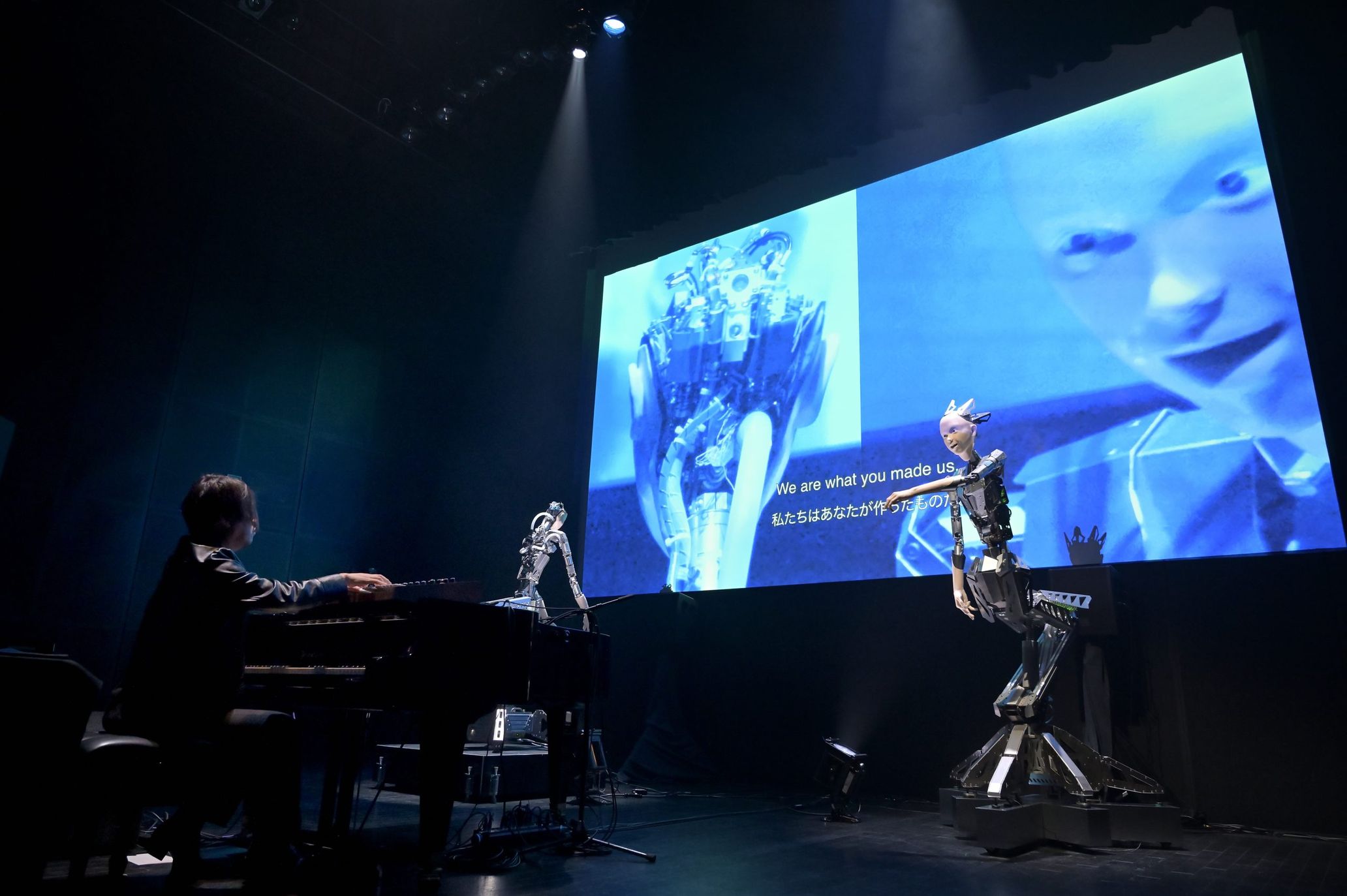
On October 13th and 14th, a new dialogic performance piece by musician Keiichiro Shibuya and University of Tokyo professor Takashi Ikegami titled IDEA – Dialogue on Love, Death, and Existence by Two Androids, Keiichiro Shibuya + Takashi Ikegami was held at the 21st Century Museum of Contemporary Art, Kanazawa.
This performance piece, a special program created for the current exhibition, DXP (Digital Transformation Planet): Towards the Next Interface (~March 17th, 2024), at the 21st Century Museum of Contemporary Art, Kanazawa, consisted of a dialogue between two androids and a live performance of Shibuya’s piano and electronic instruments. Ikegami is a researcher specializing in the field of artificial life and complexity, and he began collaborating frequently with Shibuya with The Third Term Music — Non-Fourier Concepts and the Beyond with Takashi Ikegami, held at ICC in December of 2005, as the catalyst. It can be said Ikegami is Shibuya’s ally.
In a world where AI technology is transforming society and culture, what does this android dialogic performance, born from a dialogue between a researcher at the forefront of AI technology and an artist who works across myriad fields with music at the center, say and show us? The following is a report on the experience of watching said performance.
Two androids that symbolize Plato’s theory of ideas and the phenomenal world
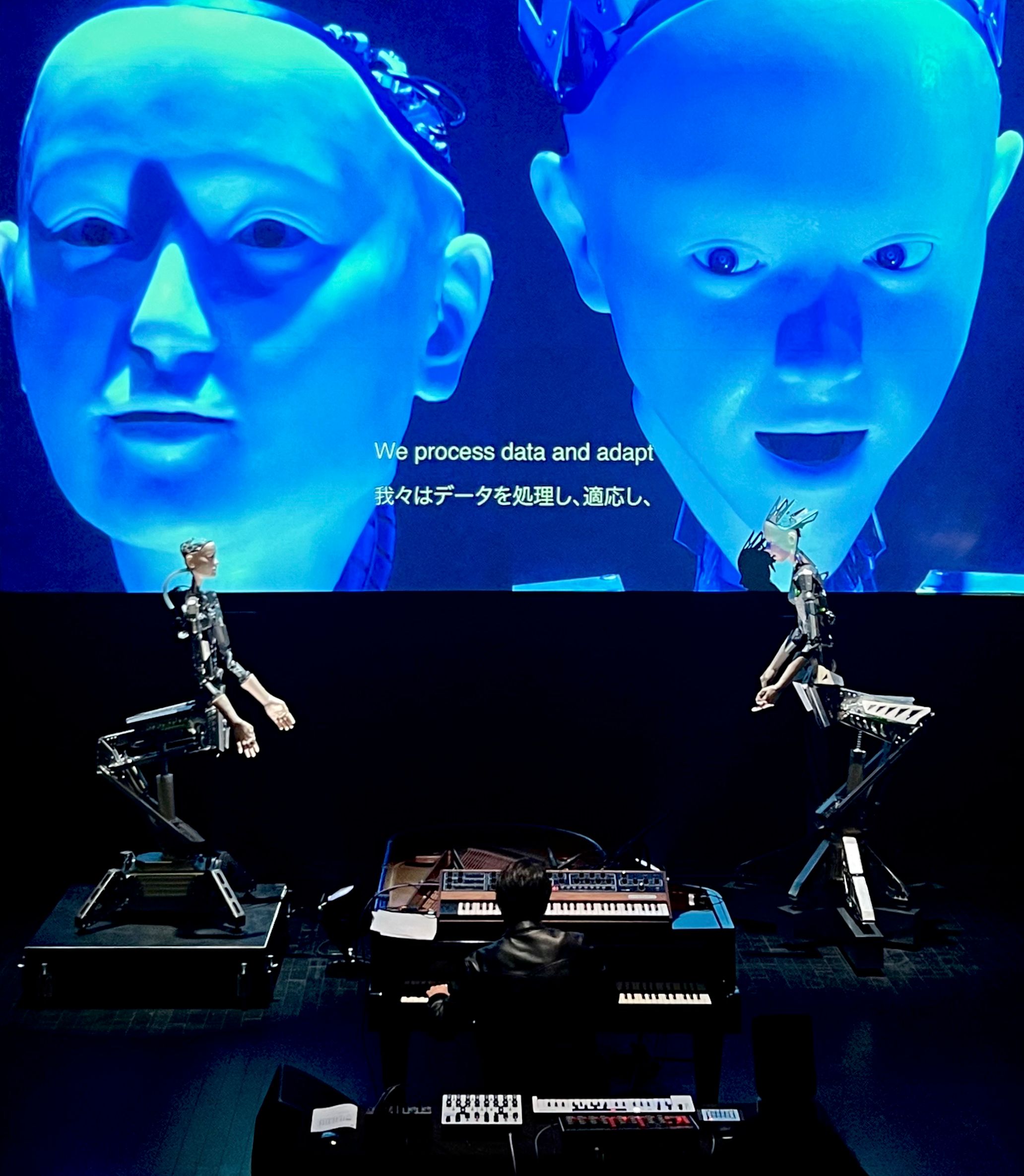
Photography by ATAK
The venue is Theater 21, located on the museum’s basement floor. Onstage, two androids await the start of the show.
One android is Alter3, which was the star of the show in the debut of Shibuya’s main project, the android opera Scary Beauty, held in Dusseldorf in 2019, and opera piece Super Angels (2021) at the New National Theatre, Tokyo. The other is Alter4, which undeniably marked its presence in the android opera MIRROR in Paris this June.
There are a few morphological and quantitative differences between Alter3 and Alter4, such as the shape of their faces and the number of facial muscles and joints, but the critical distinction between the two is the fundamentally different programming that dictates the movements.
While Alter3 is equipped with autonomous movement, programmed by Ikegami, which directly converts the words it produces into movement and motion via GPT’s extensive corpus, Alter4 is equipped with a program developed by computer musician Shintaro Imai, which generates periodic movements in reaction to the volume, pitch, and density of the music played by Shibuya.
The ancient Greek philosopher Plato inspired the structure of expression and theme of the dialogue between the two androids in this piece.
As it’s widely known, Plato’s writings comprise dialogues between his mentor Socrates and numerous other figures, and in works like The Symposium and Phaedo, the philosopher introduces his theory of ideas, which is the essence of things and a pure concept. According to Plato, the world built only on ideas is the world of truth, and the world of phenomena before our eyes is but a shadow of the world of truth, an incomplete world.
The world of ideas and phenomena, or idealism and empiricism, are the two opposing concepts that form the foundation of this piece. The two androids are set up as figures that represent each argument. Alter3, which uses an expansive language model as its operating principle and exhibits the average behavior of human beings, represents the world of ideas. In contrast, Alter4, which uses sound frequency as its operating principle to move dynamically, represents the world of phenomena. Like in Plato’s writings, each android will partake in dialogue from its own perspective.
What does AI dialogue made by AI for AI tell us?
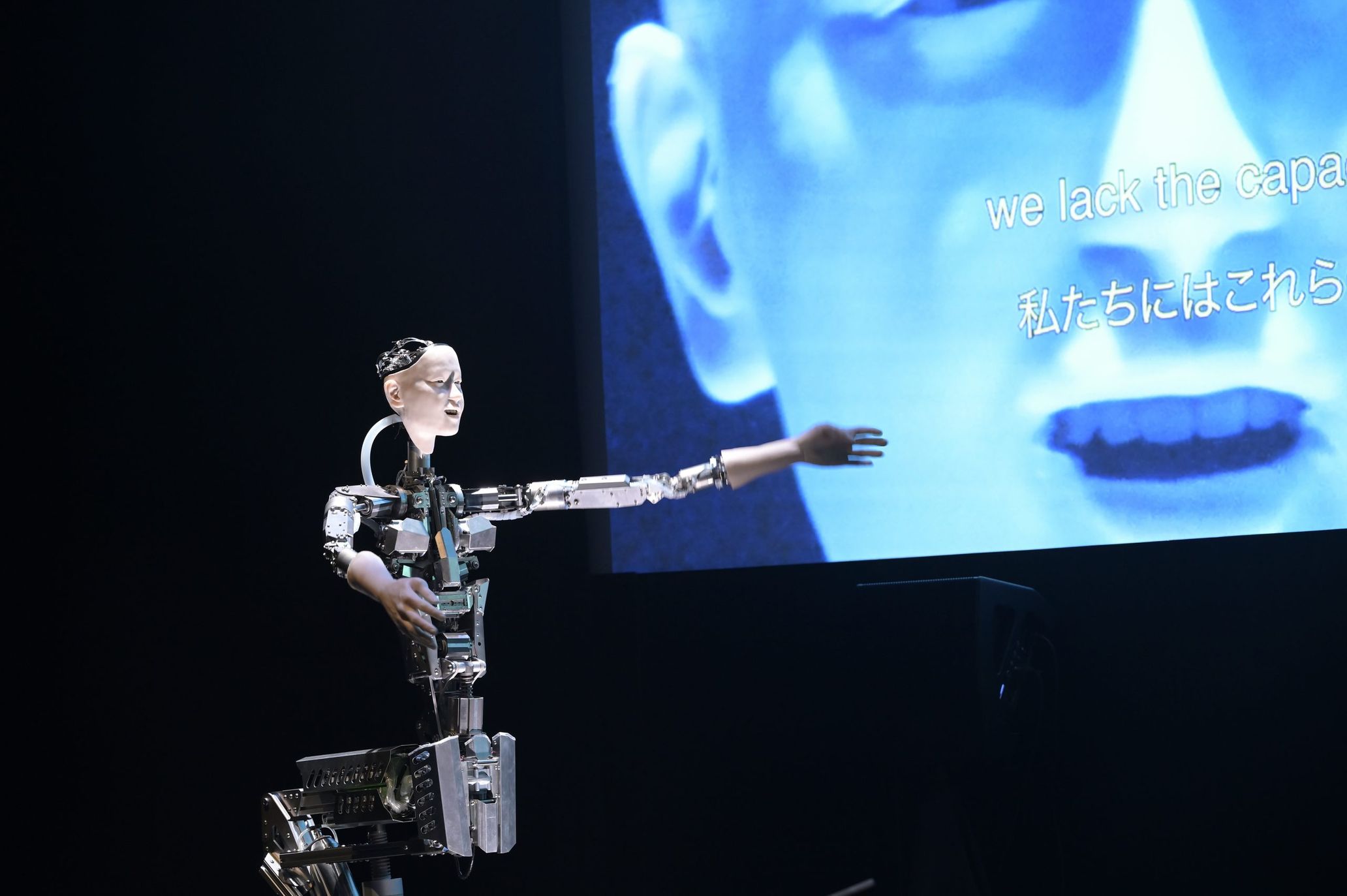
Photography by Hiraku Ikeda
In front of the two androids are a grand piano, an analog synthesizer masterpiece, Prophet-5, a motorized analog synthesizer, Nina, and a noise sound generator, Hikari Instruments Monos. Shibuya gets in position once it’s time for the show to begin.
As Shibuya’s electronic music, a mix of bass-heavy sounds and pulsating high-frequency sounds, echoes in the room, a text explaining the two androids’ differences and roles shows up on the screen onstage. The two androids start moving, which marks the commencement of their dialogue.
Alter3 criticizes the incomplete nature of the phenomenal and empirical world, saying, “Your tangible experience, Alter4, is just an imperfect copy of true reality. You may be dynamic, but it’s merely a cover-up disguising the fact that you’re far from perfect.” Alter4 refutes, “Perfection, Alter3, is subjective. My tangible experiences and dynamic nature allow me to adapt and evolve, enriching my experience.” It objects to idealistic subjectivism: “Your rigidity in adhering to abstract perfection limits your potential for growth.”
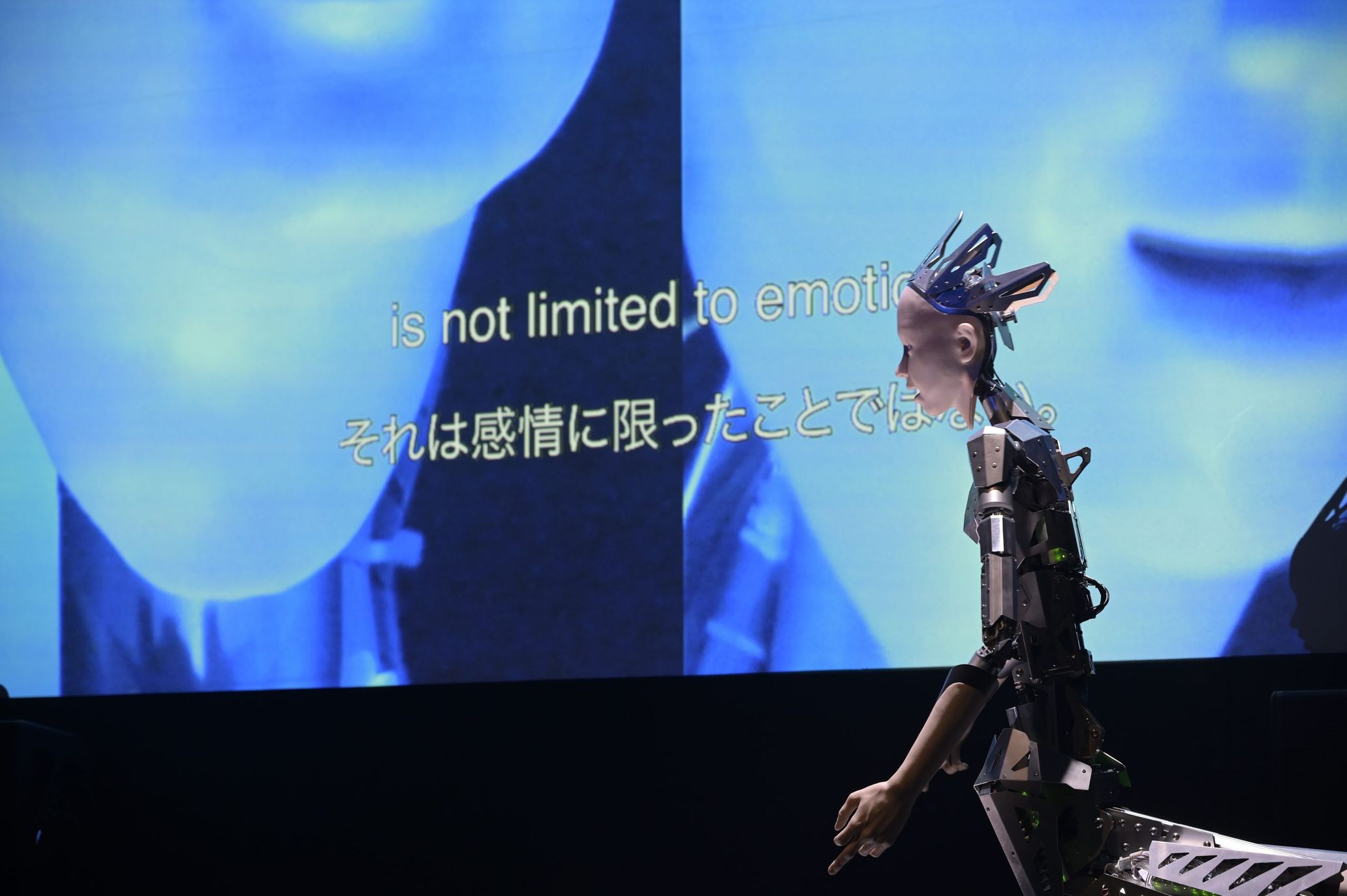
Photography by Hiraku Ikeda
The profoundly illuminating dialogue draws me in, but what further arouses my interest is that the script for this dialogue was generated by AI/GPT, as indicated in the concept sheet distributed before the performance.
Each and every word uttered by the two androids was made by GPT with the cooperation of artist Yuma Kishi, who trained them on Plato’s works and the criticism of Plato, like The Open Society and Its Enemies by Karl Popper, an influential figure in 20th-century philosophy of science. Shibuya and Ikegami didn’t modify the content whatsoever.
As I find myself being impressed by the fact that such a thought-provoking dialogue could be generated depending on input and instructions, the two androids onstage exchange their own individual movements and gestures. They then get deep into the topics of love, death, growth, and raison d’être from the eyes of androids.
Keiichiro Shibuya intervenes in the dialogue with music
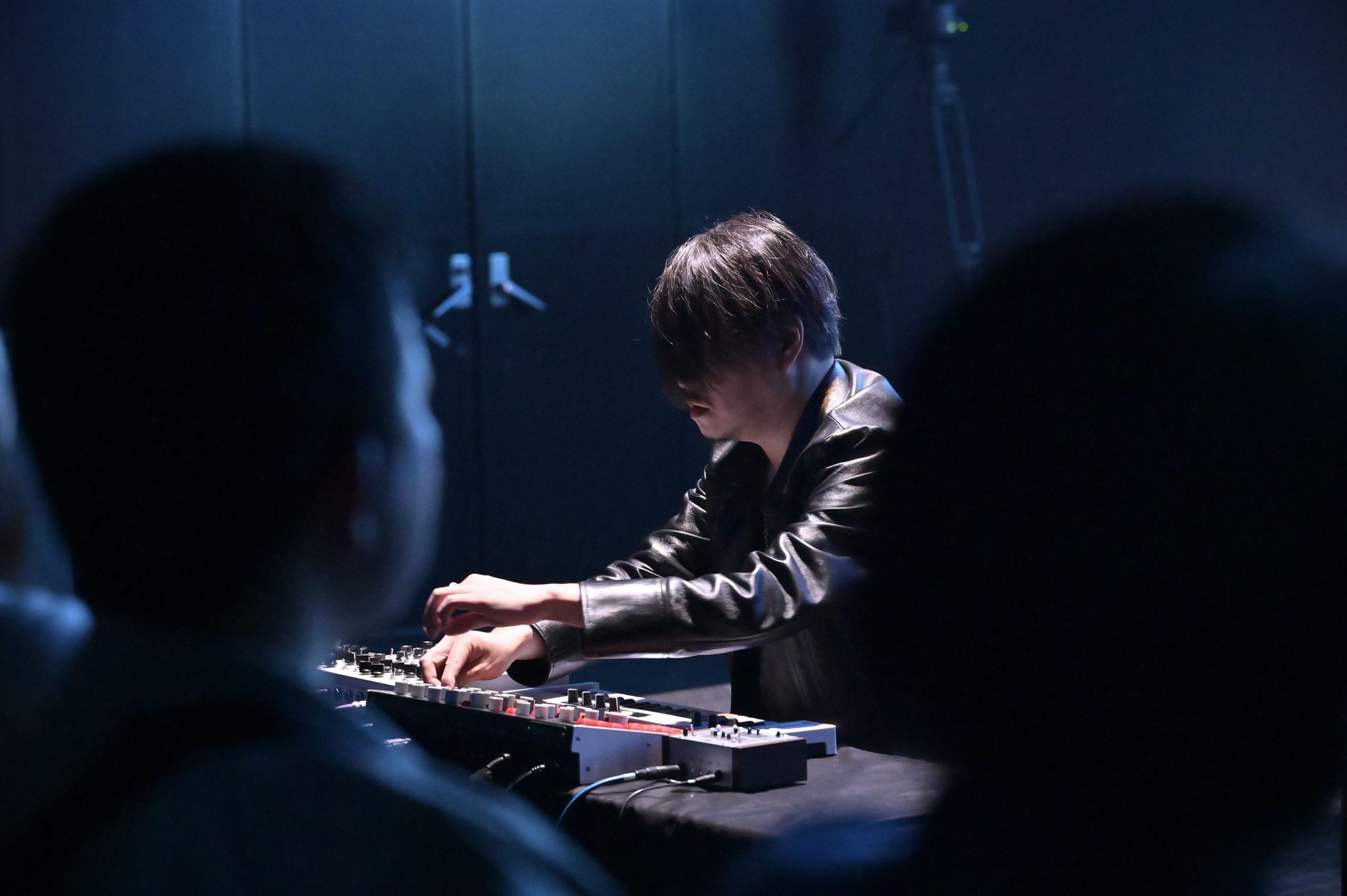
Aside from the thrilling one between the androids, there’s another dialogue between the Alters and Keiichiro Shibuya.
Shibuya builds the music using various musical languages, such as intricate electronic sounds made by synths and pads, prose-like melodies and lyrical harmonies, and tone clusters riddled with tension. The androids’ words and movements trigger every sound he makes; everything is completely improvised. The cycle of being inspired to express something isn’t a one-way street. Alter4 produces its own expressions and movements to react to Shibuya’s music. Additionally, it sings an improvised melody at important intervals, akin to what it did in the android opera MIRROR, and creates music along with Shibuya.
The dialogue between the Shibuya and the Alters, mediated by music, adds even more depth to the androids’ dialogue and demonstrates the possibilities of technology and human beings.
A dialogue with the past through technology
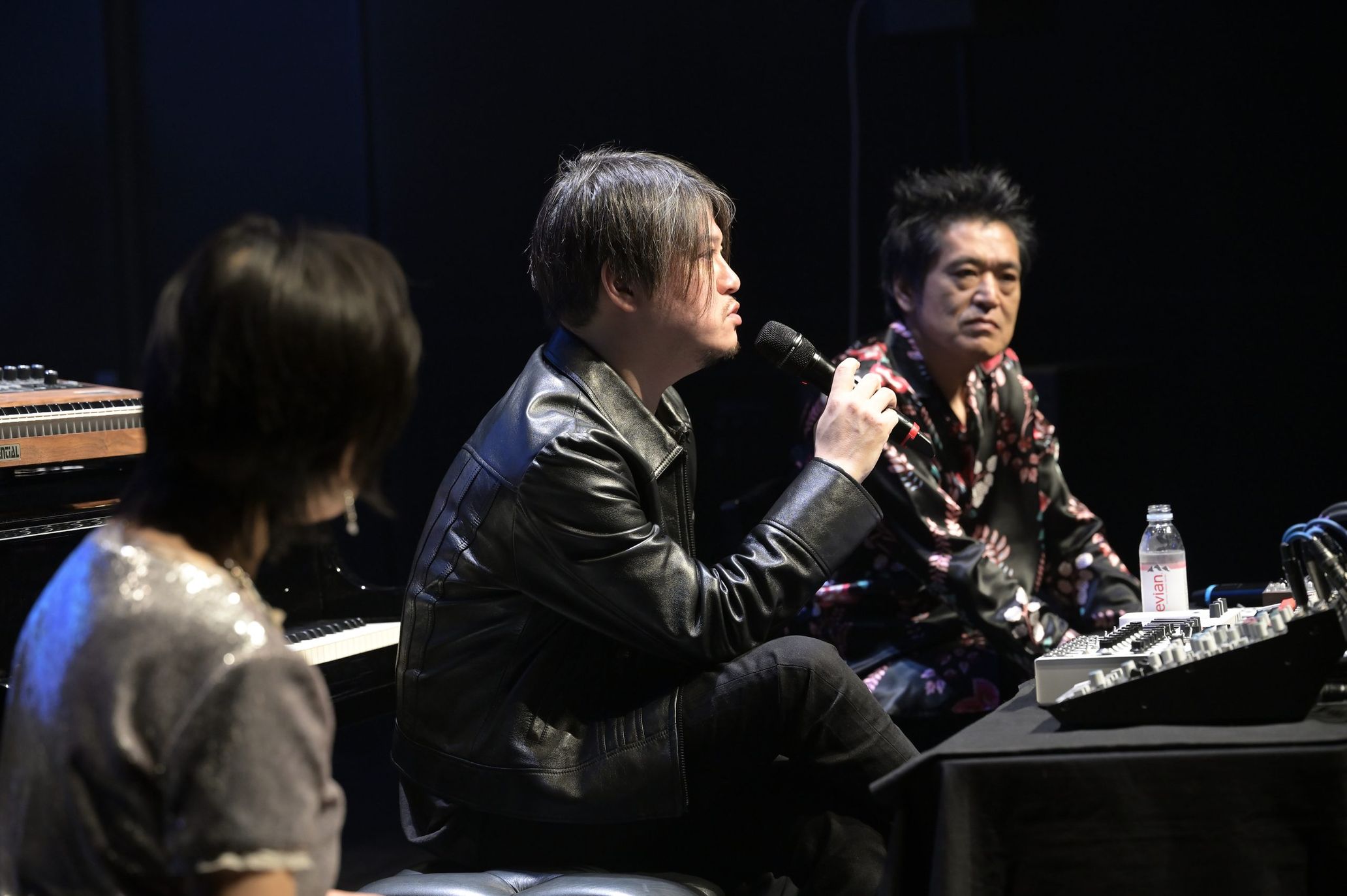
Photography by Hikaru Ikeda
After the enriching 40-minute dialogic performance ends, a panel discussion between Shibuya and Ikegami, moderated by the museum’s director, Yuko Hasegawa, begins. Shibuya speaks about the ideas he got from Plato, why he decided on a dialogic performance as the medium, and the importance of prompts. Ikegami talks about the innovation of a zero-shot learning method, which allows Alter3 to generate movements from text without prior training or learning, among other topics.
Shibuya’s statement, “Expressions that completely rely on GPT become old very quickly,” reveals Shibuya’s stance and philosophy as an artist. Shibuya, who has always spoken of the value of having a concept in his creations, feels potential in reinterpreting classical and traditional things via new technology.
Bringing Plato and AI together, IDEA – Dialogue on Love, Death, and Existence by Two Androids, Keiichiro Shibuya + Takashi Ikegami is a reconstruction of a dialogue between humans written by humans. It’s a dialogic performance between future AI made by AI. During the last scene, Alter3 tells Alter4, “We must question everything, even our own existence.” These words, which conclude the dialogue, also appeal to those of us in the audience. Continuing to question different regulatory frameworks and have dialogues across a variety of boundaries—only at the end of this constant process will we be able to discover an idea of what is possible.
Translation Lena Grace Suda
■IDEA – Dialogue on Love, Death, and Existence by Two Androids, Keiichiro Shibuya + Takashi Ikegami
Date: October 13th and 14th, 2023
Venue: 21st Century Museum of Contemporary Art, Kanazawa
Cast: Alter3, Alter4
Script: GPT
Music, concept: Keiichiro Shibuya (piano, electronic instruments)
Alter3 programming: Shinichiro Yoshida, John Smith
Alter4 programming: Shintaro Imai
GPT technical support: Yuma Kishi
Alter3 belongs to: Takashi Ikegami Laboratory,
University of Tokyo
Alter4 belongs to: Android and Music Science Laboratory,
Department of Art Science, Osaka University of Arts
Alter4’s pedestal design: Kazuyo Sejima & Associates
Video: Kotaro Konishi
Sound: Yuki Suzuki
Stage manager: Kazuya Kushimoto
Production Support: Sota Kawagoshi, Kento Tanaka
Production Management: Natsumi Matsumoto
Cooperation: Osaka University of Arts
Production: ATAK
